- Home
- James A. Michener
Report of the County Chairman Page 4
Report of the County Chairman Read online
Page 4
Stevenson Kennedy Undecided Rockefeller Goldwater
How different the strategy was now. The extreme right would have no place to go, so they’d have to vote for Rockefeller. But what was important was that the Undecided could now slide into the Rockefeller camp with no embarrassment. And I was convinced that a large proportion of Stevensonians could leapfrog over Kennedy and join Rockefeller without insulting their common sense. “With all that support,” I said glumly, “Rocky can win!”
Very soberly I went to bed and told my wife, “I’ve just figured out that if Rockefeller runs against Kennedy, the Republicans will win. If I can see this, I’m sure the Republican bosses can see it, too. So they’ll nominate him. How do you think he’ll do?”
“I’d vote for him,” my wife said without hesitation, and I realized with dismay that so would each of the other ten Stevensonians who had been arguing with me that night.
During the primaries my personal work took me to Mexico, where I had the good luck to form an acquaintanceship with our ambassador, Robert C. Hill, a new type of State Department man with a most aggressive determination to see, to know and to appreciate all of his command. We spent a week together flying in a small plane to the most remote airfields, where Mexicans awaited us with mariachi bands, festivals and dinners. Ambassador Hill was an eye-opener, both to me and to the Mexicans, and he apparently accomplished a good deal for the United States, for wherever we went the crowds immediately recognized him, and favorably. They also asked him embarrassing questions, which he tried to answer in stride, insofar as his orders from Washington would permit.
Apart from getting to know Mr. Hill, the most enjoyable part of the trip came when we were aloft, with only ourselves to worry about and with the forthcoming Presidential election to discuss. Ambassador Hill, naturally, was a Republican. In private life he had been a successful businessman and had been hand-picked by the administration, rather than by the State Department, for the critical Mexico job. He loved politics and was friendly to both Richard Nixon, whom he expected to see in the White House, and to Lyndon Johnson, who was a political hero of his. Robert Hill was never afraid to say what he thought, and we had some vigorous debates.
His entourage on this particular trip was also mainly Republican, which was proper, since he served under a Republican administration, but he did have along with him a hilarious press officer from the Midwest, and this delightful man was an ardent supporter of Hubert Humphrey. I was the other Democrat aboard and the first John Kennedy man that any of the group had met in person. I remember the astonishment that greeted my announcement that Kennedy was going to be our next President.
“He really believes it!” the ambassador’s group joked.
We were en route to one of the bleakest areas of Mexico, Santa Margarita Island, off the western coast of Baja California Sur, when the reports of the Wisconsin primary were due. I insisted that Kennedy would defeat Humphrey roundly, and remember taking some bets to that effect. The general consensus was that he would merely squeak through, and I fear that no one in the plane except me thought that whether he won or not he had much chance of either the nomination in July or victory in November.
We had flown on to La Paz, the capital of the great arid state of Baja California Sur, when the radio announced the Wisconsin results. I remember being somewhat stunned, for although Kennedy had won, his margin of victory was much less than I had been predicting. Wisconsin seemed to be a setback, even though Kennedy had contested a primary in another man’s backyard. Ambassador Hill and his team had a good deal of fun at my expense, and as on the night I had drawn the diagram showing that Rockefeller could win, I began to wonder if Kennedy had the invincibility that I had accorded him. Then came West Virginia.
I will always think of that West Virginia primary with special affection, for not only did it seal my candidate’s chances for the nomination, not only did it exorcise the ghost of Al Smith and the anti-Catholicism he suffered, but it also came when I was far from home and engaged in some of the best political debate I have known. I was in Guatemala with a group of American military personnel who loved politics and who were extraordinarily adept in piecing together data and making deductions therefrom.
Day after day we gathered to discuss the impending conventions, and at each meeting one or another of us would have some special information gleaned in some special way. Adlai Stevenson had lately been through the area and he had said thus. Lyndon Johnson had been visiting Ambassador Hill and he had reported so. Ambassadors from other countries had been of this opinion. An admiral who had flown in from Washington had spent some hours with Nixon, and he offered new data. I doubt if there could have been many places, in those exciting weeks, where the political fortunes of the United States were more vividly and intimately discussed than in Guatemala.
And all we heard or knew confirmed our belief that the West Virginia primary was going to be the critical test. Those who knew the South were convinced that West Virginia’s natural anti-Catholic animus would defeat Kennedy. Those who knew Hubert Humphrey were satisfied that he had picked for his maximum effort the one state which was most likely to yield him victory. Finally a group of us gathered one night in Guatemala City to argue politics only, in an orderly way and with each man citing his sources, for a period of about four hours.
The conservative and Republican side was defended by a brilliant naval captain, Jacob Heimark. The shrewd middle-of-the-road position was expressed by the cleverest man of the group, the naval aviator and certificated lawyer, John Meisenheimer. The liberal position was defended by me, while two or three army officers stood by to subject anything said to rigorous analysis. In the exciting months that were to follow I often found myself wishing that I could reconvene that brilliant group of men, who though far from America were yet so conversant with American problems.
As the evening wore on, circumstances required each man to put up or shut up, for clarity demanded that each say exactly what he thought was going to happen. I shall not report what voting preferences Captain Heimark and Lieutenant Meisenheimer expressed, for our meeting did have a kind of confidential nature about it, since we were being brutally frank in our expressions, but I can recall my own avowed position on the eve of the West Virginia primary.
Even though our meeting was held during the days when American newspapers were reporting the likelihood of a 60-40 vote in favor of Humphrey, I argued that Kennedy would win the West Virginia primary by not less than 54 percent of the total vote. My contention was so surprising that two members of the group forced me to bet money on my belief, and after I had done so they asked, “How can you possibly believe that Kennedy will win?”
I remember stopping and trying to reconstruct the reasons why I was so sure that the Massachusetts senator would win, and I recall saying, “I think so because to think any other way would be to admit defeat. And Jack Kennedy is not going to lose either the nomination or the election.”
“You call that logical thinking?” Captain Heimark pressed.
“I’m not even sure it should be called thinking, logical or not,” I replied. Then gradually the basis for my irrational position became clear to me and I said, “What I mean is this. I’m perfectly willing to agree that the people of West Virginia are bigoted, but I’ve worked in that state and I know they are not damned fools. In this primary they have no real option. It’s Kennedy against Mister Nobody, and Kennedy has got to win because the people of West Virginia will not throw away their votes on a man like Senator Humphrey, who has no real chance.”
“But if Kennedy were running against Lyndon Johnson in this primary, who would win?” Captain Heimark probed.
For the first time in the primaries I said something that was slowly penetrating my consciousness: “Captain, if either Lyndon Johnson or Adlai Stevenson were contesting the West Virginia primary, they would probably win, and Jack Kennedy would have no chance for the 1960 nomination. But neither of these men had the guts to contest it, so Kennedy’s g
oing to win, and he’ll go on to win the nomination, too.”
Captain Heimark asked, “And you really think your man will win by 54 percent of the votes cast tomorrow?”
“I suspect he’ll win by much more,” I said. “But I’m positive he’ll win by at least 54 percent.” When the votes were counted he had won by 60 percent, and any substantial chance of stopping him in Los Angeles had vanished, although as you will see shortly, I didn’t recognize this latter fact at the time.
My next two guesses that night in Guatemala were not so good. As to the Republican nomination, I was forced by the debaters into betting that Nelson Rockefeller would be the choice. When pressed for my reasons I said, “It’s perfectly obvious to me that President Eisenhower doesn’t want Richard Nixon. You know that, so I must suspect that the general electorate knows it, too. I know that the professionals in the party turned Rockefeller down last Christmas, and I know they don’t want him now. But they’re not going to commit suicide and turn down a sure winner. Watch! At Chicago they’ll swallow their pride and nominate Rocky.”
Lieutenant Meisenheimer would have none of this. He argued, “I think it was Boise Penrose of Pennsylvania who said, ‘If a real politician ever faces a choice between losing control of his party or losing a specific election, he never hesitates a moment. He’ll throw away the election and keep the party.’ The professionals will never accept Rockefeller, because he smells too much like Wendell Willkie. I’ve known some real Republicans who truly hated Roosevelt, but they hated Willkie a lot more, because all Roosevelt did was win elections, whereas Willkie won control of the party.”
I countered by pointing out that friends had told me the same thing about the professionals in 1952: “They’ll never turn down Taft and take Eisenhower.” I pointed out that in the end they had been forced to do just that.
Lieutenant Meisenheimer replied, “But General Eisenhower was in every respect a special case. Besides, Taft couldn’t have won. Nixon can.”
My third prediction was that if Rockefeller did not win the nomination he would certainly accept the Vice Presidency. Again Lieutenant Meisenheimer challenged me with the single most incisive comment I was to hear during the nominating period. As I recall the course of his argument he reasoned, “We must assume that the differences between Nixon and Rockefeller are real. And these differences, being intellectual, constitute irreconcilable elements. Now either Rockefeller is an adventurer or he is not. If he is an adventurer, he’ll accept the Vice Presidency, but I’m convinced he’s not an adventurer, so as an honest man he will have to reject compromise. The reason I think he’s an honest man is that the reports of the Rockefeller brothers practically constitute a platform for the Democratic party, and he is either going to have to rescind every one of those reports, or he is going to have to stand on them. He’ll do the latter, I’m quite sure, and if he does that he cannot possibly at the same time accept second place on any team running on the Republican platform. So you can forget Rockefeller as Nixon’s Vice President. He cannot possibly accept such a position, not because of vanity but because he is a logical and an honest man.
“Furthermore,” Lieutenant Meisenheimer continued, “if Nixon wins in November he’ll certainly run again in 1964 and will probably win then, too. In this century the only incumbents to lose at the end of one term were Taft, because Teddy Roosevelt led a splinter party, and Hoover, who got caught in a depression. In 1968 Vice President Rockefeller would be too old to run. Moreover, if he were the Vice President to Richard Nixon’s President, he’d find the job unrewarding and stifling, because Nixon’s view of the Presidency would surely be much different from Eisenhower’s. I doubt that Nixon would permit his Vice President to wind up in 1968 as the inevitable choice for the nomination.
“And finally,” Meisenheimer argued, “Rockefeller would not have issued those reports unless he was pretty sure that Nixon would lose in 1960. He knows that Nixon is doomed. His logical game is to sit aside, watch the debacle, and offer himself to the party in 1964.”
When Lieutenant Meisenheimer was making these remarks I did not recognize their pertinence, for I responded, “You overlook one thing, John. Nixon running with Rockefeller might possibly win the election. Nixon without will surely lose. Now if the old professionals know that their side lost simply because Rockefeller refused to lend a hand, he will be forever dead in the Republican party. You claim that if he sits to one side and watches Nixon lose, he can then offer himself as an alternative in 1964. If he contributes to the loss of this election every professional will work to destroy him in 1964.”
Lieutenant Meisenheimer replied, “Smart politicians take each year as it comes. If Kennedy wins in November, by 1964 the Republicans may be very happy to have Rockefeller on hand, no matter what they thought of him in 1960.”
My fourth prediction was one of the few bits of real insight I had during the campaign, and once I stated it, I never reconsidered: “I don’t know who is going to be the Democratic nominee. Obviously, when Kennedy wins tomorrow in West Virginia he’ll be in front position. But you fellows claim the old professionals in the Democratic party won’t have him. If you’re right, they won’t have Stevenson either, and they know they can’t win with Symington. So I suppose it’ll have to be Johnson and Kennedy. And I think they’ll win.”
Captain Heimark asked, “You think that Jack Kennedy will accept second spot on the ticket?”
“Any one of the four leading contenders will accept either first spot or second.”
Lieutenant Meisenheimer probed, “You think Johnson would accept second spot to Kennedy?”
“Sure,” I said, “and I hope that’s the way it works out. Because that ticket might prove to be the very best.”
Captain Heimark was not entirely satisfied. “You think that Adlai Stevenson would run in second place with Kennedy?”
“If asked,” I said. “Or Kennedy will run in second spot to Stevenson. The difference between my Democrats and your Republicans is that your two top men can’t get together to win an election, whereas our four top men will submit themselves to any possible combination in order for the party to win.”
Somebody asked slowly, “Let me get this straight. You are saying that in your opinion Lyndon Johnson would accept the Vice Presidency in second place to Jack Kennedy?”
“Certainly,” I replied.
Then Lieutenant Meisenheimer asked bluntly, “But tonight, what do you think the ticket will be?”
I thought for some time and said, “I suspect it’s going to be Johnson in first spot and Kennedy in second, but I sure hope it works out the other way.”
Guatemala illuminated two other aspects of the campaign. Adlai Stevenson had recently passed through Mexico and Latin America, and I was surprised at the manner in which Republicans who might have been disposed to scorn him said, “Stevenson accomplished wonders for the United States down here. No American in recent years has done as much. It’s one thing to see Adlai at home, where the press is always hammering him. But it’s quite different to see him overseas, where he’s about the only American the foreign nations really respect.” Listening to many such comments, I began to suspect that Stevenson might have a better chance for the Presidency than I had originally thought, but if he did not win, I hoped that the victorious Democrat, whoever he might be, would find a major place for him in his official family. My wife, of course, exulted, “See! I told you, Adlai’s the only candidate of any stature.” I replied, somewhat churlishly I’m afraid, “If he could win, I’d be for him.”
The second discovery was in some ways more amusing, in others, more ominous. An American wife, normally a loyal Democrat, chuckled, “I hope Rockefeller wins, and I’ll tell you why. I want to see the startled look on America’s face when he decorates the White House with his personal art collection. Picasso, Jackson Pollock, Feininger and Jack Levine! It’s about time we had some art in our life, after the dreadful drabness of the last eight years.”
I asked, “Would you
, a good Democrat, vote for Rocky against Lyndon Johnson or Jack Kennedy?”
“I sure would,” she snapped. “Rocky knows his way around. He’s modern. He talks my language, and we’ve got to get some vitality in the White House. Can’t you just imagine Rocky’s first musicale? Not Guy Lombardo, not Meyer Davis, not Lawrence Welk, but the Schola Cantorum singing Carl Orff. That I want to see.”
I returned to Pennsylvania to find the U-2 incident splashed across the papers, and from the first I took a much more grave attitude toward this than did some of my friends, who found considerable consolation in Time magazine, which pointed out that after all the incident merely demonstrated our ability to penetrate Russia.
I had known something of the problems of espionage, and a fundamental understanding of all who occupied themselves with it was that if they were caught by the enemy, their own government would piously wash its hands of the whole affair. When the Eisenhower administration elected to pursue a course counter to historical precedent, I suspected that real trouble would follow, for one of the basic arrangements whereby nations are able to continue talking with one another had been breached. Along these same lines, I was appalled at the reported behavior of the aviator, Francis Powers, and it seemed to me as if a segment of our whole national posture had been willfully jeopardized. Both the government and the man behaved badly, and when Power’s trial eventuated, he proved the sickliness of the situation. As one general observed wryly, “He certainly was no Nathan Hale.”
I was on the point of writing to the New York Times, advocating that the Paris summit meeting be canceled by us before something worse took place, but my friends dissuaded me from such a course, and I sat back waiting for the time bomb to explode. I remember taking consolation in the fact that at least one of the Republicans’ major campaign issues was about to be blown sky-high. They could not, in October, claim that they had brought peace in our time, for now what many of us who worked abroad knew, would become apparent to all: that America was far from true peace and that her international posture had deteriorated badly in the last eight years.

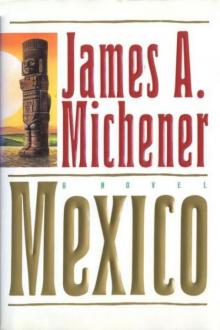 Mexico
Mexico The World Is My Home: A Memoir
The World Is My Home: A Memoir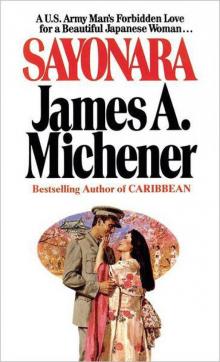 Sayonara
Sayonara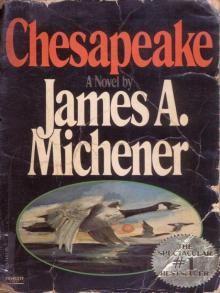 Chesapeake
Chesapeake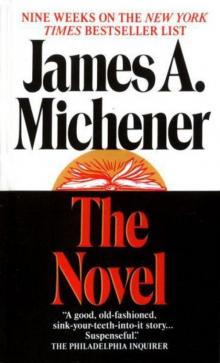 The Novel
The Novel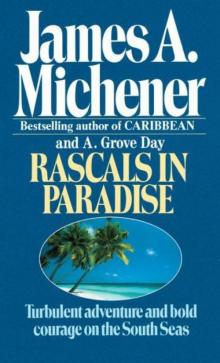 Rascals in Paradise
Rascals in Paradise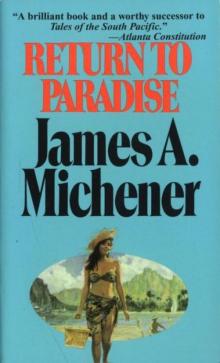 Return to Paradise
Return to Paradise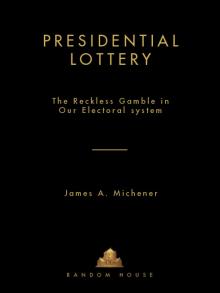 Presidential Lottery: The Reckless Gamble in Our Electoral System
Presidential Lottery: The Reckless Gamble in Our Electoral System The Source
The Source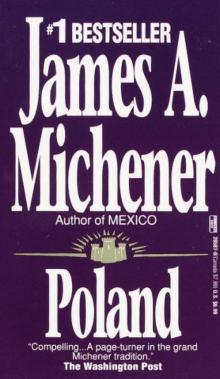 Poland
Poland Space
Space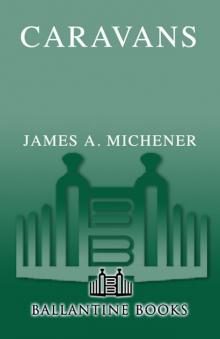 Caravans
Caravans Creatures of the Kingdom: Stories of Animals and Nature
Creatures of the Kingdom: Stories of Animals and Nature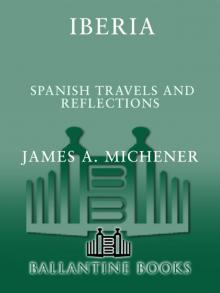 Iberia
Iberia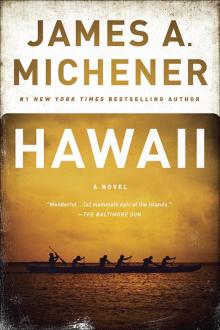 Hawaii
Hawaii The Watermen: Selections From Chesapeake
The Watermen: Selections From Chesapeake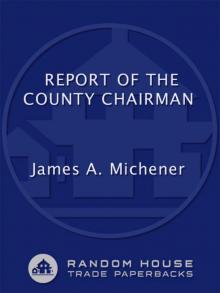 Report of the County Chairman
Report of the County Chairman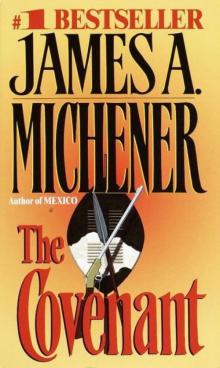 The Covenant
The Covenant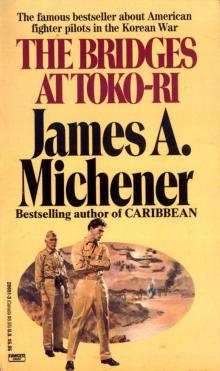 The Bridges at Toko-ri
The Bridges at Toko-ri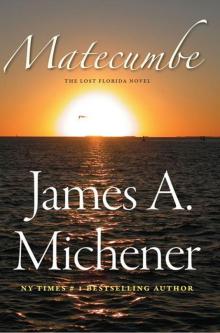 Matecumbe
Matecumbe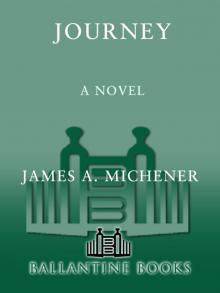 Journey: A Novel
Journey: A Novel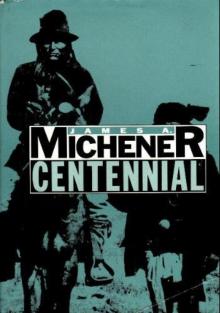 Centennial
Centennial Sports in America
Sports in America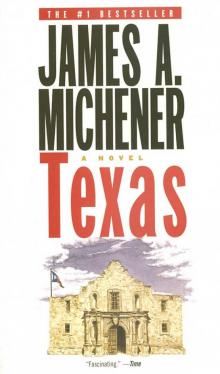 Texas
Texas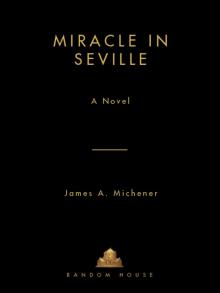 Miracle in Seville
Miracle in Seville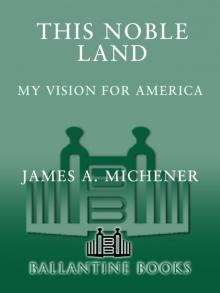 This Noble Land: My Vision for America
This Noble Land: My Vision for America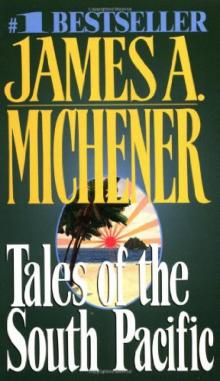 Tales of the South Pacific
Tales of the South Pacific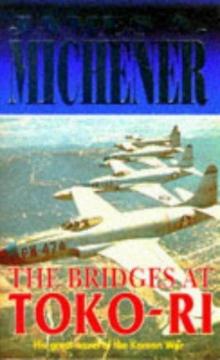 Bridges at Toko-Ri
Bridges at Toko-Ri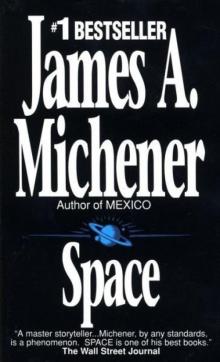 Space: A Novel
Space: A Novel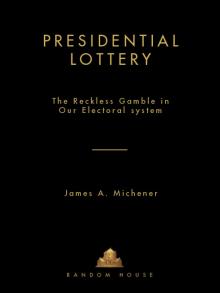 Presidential Lottery
Presidential Lottery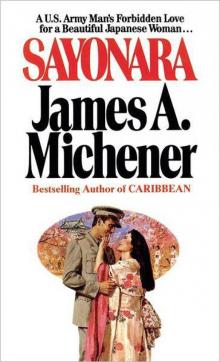 Sayonara: A Novel
Sayonara: A Novel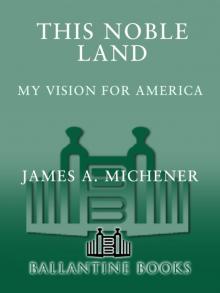 This Noble Land
This Noble Land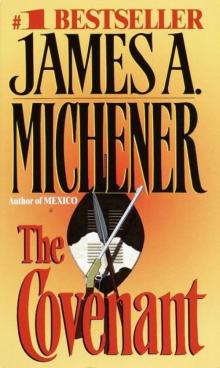 The Covenant: A Novel
The Covenant: A Novel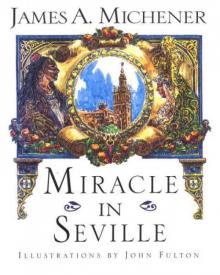 Miracle in Seville: A Novel
Miracle in Seville: A Novel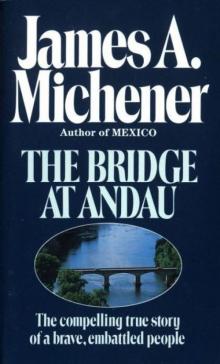 The Bridge at Andau
The Bridge at Andau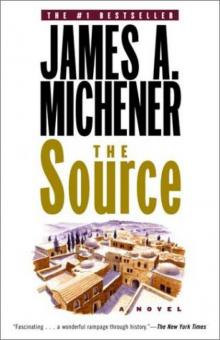 Source
Source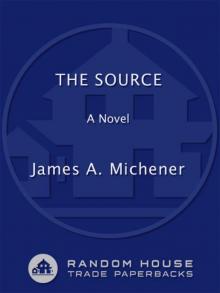 The Source: A Novel
The Source: A Novel Journey
Journey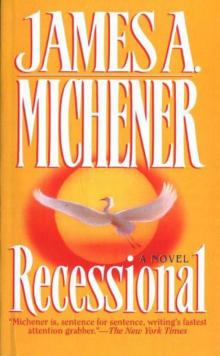 Recessional: A Novel
Recessional: A Novel Legacy: A Novel
Legacy: A Novel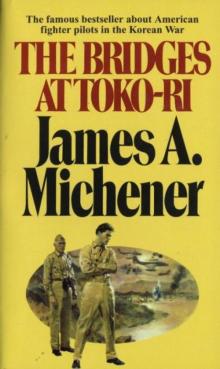 The Bridges at Toko-Ri: A Novel
The Bridges at Toko-Ri: A Novel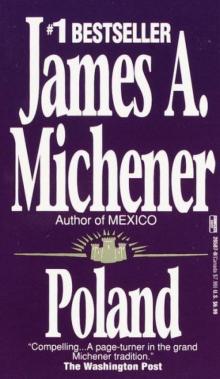 Poland: A Novel
Poland: A Novel